| November 27, 2008 at 14:16:29 10 INDISPENSABLE BROADCAST JOURNALIST'S WORDS/PHRASES by Vince Williams Page 1 of 2 page(s) |
|
For all those contemplating a career (however brief or cursory) in television journalism, and for anyone entertaining the prospect of undergoing being interviewed, there are ten words/phrases you simply must know and have at the ready. In fact, you should grapple them to your soul with hoops of steel, so much so that everyone populating your dreamscape during slumber time tosses them in sans shame or shyness. Be advised, these are not optional or open to personal whim or whether; they are absolutes and are to broadcast journalists and their interviewees what plumber’s putty is to Joe the Plumber (and, for that matter, what Joe the Plumber is to Sarah Palin’s campaign for anything).
And so, without further preamble (or ado), here they are:
1. “LOOK” [This is an all-purpose word you must drop in (as inconspicuously and naturally as possible), sometimes twice in the same sentence. It serves to direct attention to what might follow, and sounds like you know what you’re talking about even though you don’t.]
2. “YOU KNOW” [A meaningless phrase that can help give you a fleeting second of think time for your next meaningless, but important-sounding, item of information. While not used as frequently as “Look”, it can help give “Look” a rest so you’ll sound like you’re armed with more of these empty journalist expressions than just one.]
3. “THAT BEING SAID” [Very useful to impress the viewer with the promise and expectation of Harvard erudition, this phrase nevertheless should be used somewhat guardedly: always take care not to use it before you’ve said something, and try to follow the phrase with something that is either totally unrelated, or has a surprise connection to that being said.
4. “CLEARLY” [This word is best used when you know absolutely nothing about the topic, but you know you have to say something or lose your job. It just sounds good and has the power of transforming a village idiot into a prima agnomina.]
5. “NOW” [Used purely as a filler word and not to mean “at the present time”, this word has the ability to sound folksy and local. Employed by journalists who hope to be your friend, it can invite a listener to tune in again as in the example “Now, the tornado blew through the small community and demolished some fifty homes.” Doesn’t that sound just like Uncle Ron or Aunt Alma?]
6. “STAY WITH US” [Here’s a phrase, generally used after a teaser, that hopes you’ll not mute the sound of the next four commercials that help pay the journalist’s salary.]
7. “WHEN WE COME BACK” [This phrase intros a teaser which needs to include either an unsolved mystery or the beginning of some dynamic story whose ending when we do come back may be generally a disappointment (but that’s ok since you’ve watched the intervening commercials).]
8. “THANKS FOR …
… YOUR INPUT” [A pleasantry which, when decoded, means “You’re done, buster; now shutup.”]
… YOUR EXPERTISE” [One step up from “… your input” and, when decoded, means “What in the hell did you just say?”]
… HAVING ME” [The way an interviewee can thank a journalist host for making it sound like I didn’t know that Africa was a continent. (I have since been told otherwise.)]
… BEING WITH US” [A signoff to the audience for this segment. This is code for “Now, you’ll have to put up with my replacement who’ll pick it up in the next hour. As for me, I’m gonna go home, kick back and have a glass of wine. Maybe two.”]
9. “LET’S TALK TO …” or “WE TURN NOW TO …” [This is the approved way to throw it to a location reporter or a network “analyst” while you floss your teeth or replace your earpiece so you can hear your producer help you with the pronunciation of “Achmadinejad”, Zimbabwe, or some other name or word.]
1 | 2
I was born when I was yet quite young, and was second-born in a litter of two. My twin sister and I are not now, nor have we ever been, identical as evidenced by our differing balding patterns: she has very little facial hair. If you look us straight in the face, you'll be able to tell the difference. We were, however, womb-mates (and not cell-mates) which nevertheless allowed us to escape strict indivuality for quite some time. In any case, now that we're both in our dotage, I am a stage actor, and she is not. I have had quite a few poems published and am an accomplished oil-paint artist. These are a few aids to help with identification.
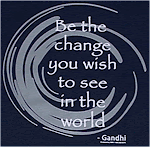






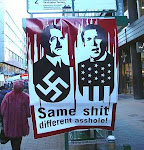
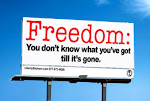


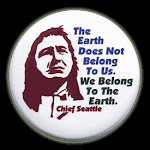



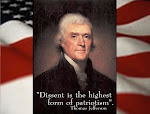
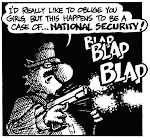



No comments:
Post a Comment